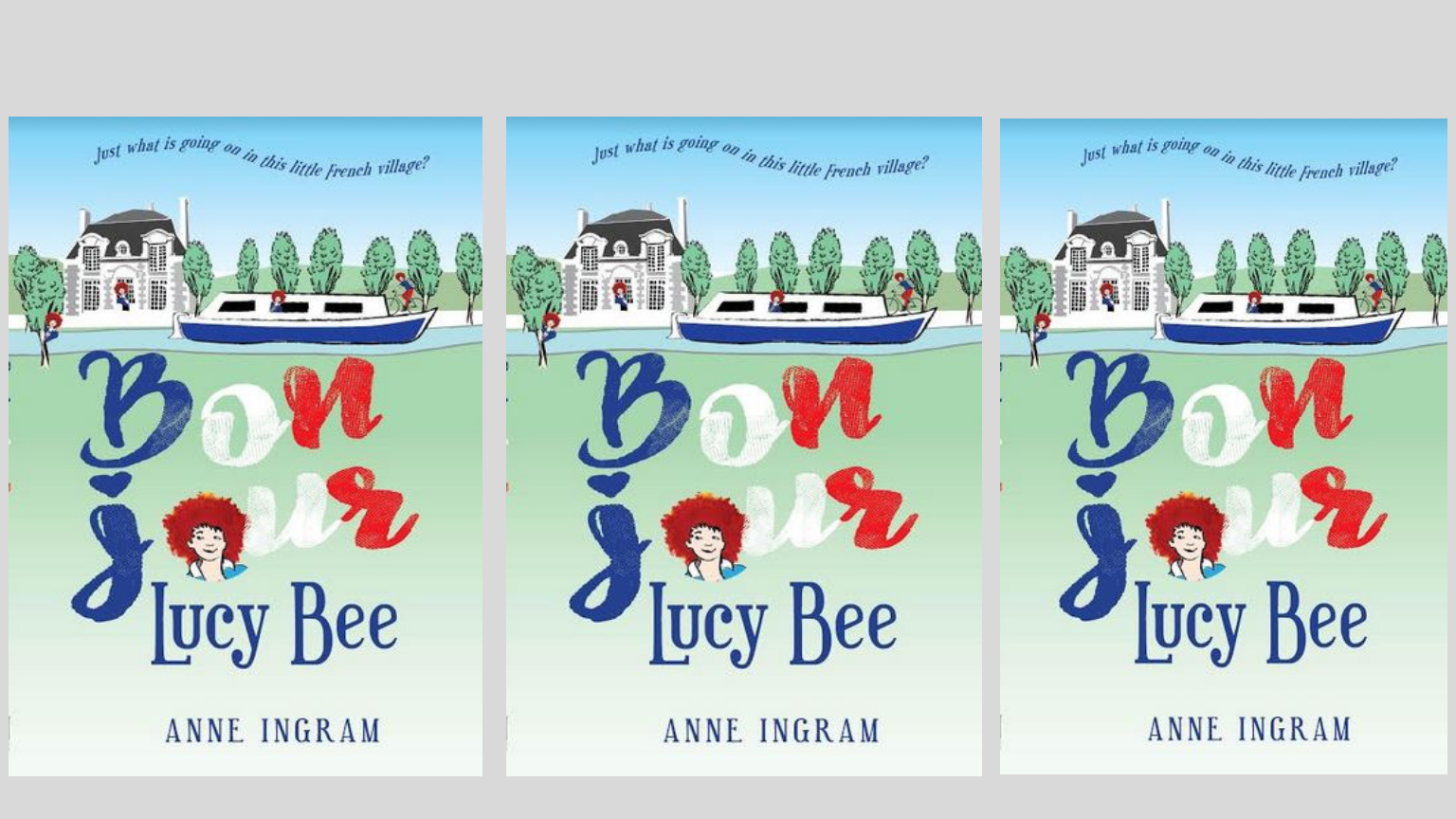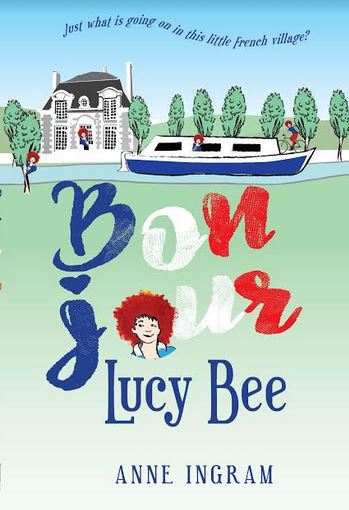By Anne Ingram
Bonjour Lucy Bee is a fast-paced holiday adventure novel. Lucy Bee is on a family reunion holiday in France when she finds an injured boy behind a bush. Having some idea that he is a refugee, she hides him and gets help. But there is something amiss in their part of France – precious articles keep getting stolen from chateaux. OneTree House has kindly allowed us to present this sampling of a new book for junior fiction readers.

CHAPTER TWO
When we went downstairs, the house was quiet, the dining room empty, the guests having had their breakfast and gone out for the day. Sylvie and Jean-Luc had left for school.
Tante poured us both a cup of coffee, making mine mostly milk. It was the first time I’d had coffee and it tasted bitter. The croissants were yummy, though. I had two with black cherry jam.
“Did you phone Nanna Kate last night to see how Gamma is?” I asked.
“I tried but just got the answerphone,” Mum said.
“I left a message. Perhaps we’ll hear something today.”
Tante nodded. “And today, I show you the village. You can see the château!”
I thought of Megan, my best friend at home. How she’d love to see a real French château. She’d be green with envy.
Tante and Mum took ages to finish breakfast (actually they’d finished eating, they were just talking endlessly) so I left them to it, thinking I’d go and have a look at the canal and the boats I’d seen from my window.
Through the open front door a movement through the trees caught my eye. I ran across the grass, through the trees to the bank, just in time to see the black barge casting off. Avila was painted along the side in white. A skinny man in shorts and grubby white vest was coiling up a rope at the stern. He had a ponytail. I waved. He glared at me, then turned and stepped into the wheelhouse.
Through the open front door a movement through the trees caught my eye. I ran across the grass, through the trees to the bank, just in time to see the black barge casting off.
“Be like that then,” I said.
We walked to the village along a pathway that ran alongside the blind house.
“Who lives there?” I asked.
“Raoul. He is brocanteur – he sell old things.”
“Antiques?” Mum said.
“Oui. But now he stay above his shop in the village. The house it is closed.”
It sure was. Every single window was shuttered up tight as though it was hiding something. The village was busy with cars edging their way through narrow streets, and people dodging traffic. Everyone knew Tante and stopped to say “Bonjour Madame”. When Tante introduced Mum and me, we started saying bonjour too. But then people replied to us in French and we couldn’t understand them. Only a few spoke English.
Madame Daubigny, Sylvie’s ballet teacher was one. No wonder I’d thought Sylvie looked like a ballet dancer – she was a ballet dancer. “Sylvie is very good pupil,” Madame told us. “She move delicate like a fairy and she is strong also. But perhaps, more practice est nécessaire.” I couldn’t take my eyes off Madame Daubigny’s painted face with her bright blue eye shadow and red lipstick leaking into wrinkles around her mouth.
The shops were small and full of people. A queue came right out the door at La Boulangerie. Through the window I could see baskets of bread and trays of pastries. The smell was amazing. My stomach was rumbling and we’d only just had breakfast.
As we climbed up the slope, past tubs overflowing with flowers, church bells chimed. We had to step down onto the cobbled road to get past a café that had tables all over the footpath. Ahead, at the top of the road were a pair of huge black wrought iron gates with gold scrolls along the top. “Our château, Trebigny,” Tante said. “The village grow around it. So, it have le nom Trebigny also.”
Ahead, at the top of the road were a pair of huge black wrought iron gates with gold scrolls along the top. “Our château, Trebigny,” Tante said. “The village grow around it. So, it have le nom Trebigny also.”
A tourist bus ground its way past us up the hill, stopping by the gate. Passengers poured out. “Can we go inside the château?” I asked.
“Of course,” Tante said.
“Demain, tomorrow. Today we look only.”
Once we had passed through the gates I could see a castle. It had a moat! A bridge across it led through a tall gatehouse into a large square courtyard in front of the château.
“It’s lovely!” I breathed. “Like something out of a fairy tale.”
Turrets, towers and tall chimneys rose up from sloping grey roofs, and peaked windows like heads with caps on peered down from the attic. The château was a peachy yellow with rows of tall windows running along each side of the huge entranceway. Already, tourists from the buses were walking up the front staircase.
Suddenly a man burst out of the door, his hands raised, palms facing outwards as if to say ‘Stop where you are!’ I watched the tourists halt halfway up the steps. The man waved his arms about, explaining something. Shaking their heads in a disgruntled way, the tourists marched back to the ticket office and began queuing up outside.
“Perhaps they didn’t know they had to buy tickets,” Mum said.
“They might be getting refunds.” I pointed to the man moving barrier fences behind the gatehouse, shutting off access to the château.
A black car careened out of a side entrance, tooting non-stop. A young woman leapt out and waved us back. She nodded at Tante, clearly recognising her.
“Bonjour Marie,” Tante called. “Quel est le problème?”
The woman spoke urgently, rapidly, but even I got that there was some kind of emergency and we had to leave.
Reluctantly I followed Mum and Tante back towards the gates, the tourists trailing behind us. We’d no sooner gone through the gates when an ear-splitting blaring filled the air. A police car drove at speed through the entrance and up to the gatehouse. Then, another blaring siren, another police car. This one screeched to a halt beside us. Two officers jumped out and pulled metal barriers and signage from the car, setting it up outside the gate. Accès interdit!
Reluctantly I followed Mum and Tante back towards the gates, the tourists trailing behind us. We’d no sooner gone through the gates when an ear-splitting blaring filled the air.
People were jostling all around me, French people from the nearby shops and cafés talking and pointing. The policemen by the gate came over and began to question some of them. There was a lot of arm waving going on and everyone spoke so fast it seemed like gabble.
“Some personnes, they break into the château,” Tante whispered as we walked past.
“Did they take anything?” I asked, then when I saw she didn’t understand, said, “Steal anything?”
Tante looked anxious as though it was her house that had been broken into. “I think, yes,” she said. “Come. We go to meet Sylvie.”
Down the hill a little way we turned left into a square and there was Sylvie’s school. Above the door was the sign ÉCOLE and above that a red, blue and white flag, the French flag. “We are early. Let us sit,” Tante said, leading us to a stone bench outside the church opposite. The front of the church above the door and all down the sides was covered in carved stone figures – angels, people and animals. They were amazing. So lifelike.
A bell sounded and around the side of the school rushed a swarm of kids. A few looked to be about my age but most were younger. They were all going home for lunch, Tante told us. Sylvie danced over to us, smiling. “Bonjour!” She kissed her mother and then Mum and me. It was both cheeks again.
When I told her what we’d seen at the château she looked confused, twisting the loose strands of hair around her face.
Tante explained in French what had happened, then turned to Mum and me. “Perhaps cet après-midi, this afternoon, we know more.”
Back at La Maison du Canal, Nina, the lady who helped Tante clean the guest rooms, had lunch ready for us. I’d never seen anyone with hair dyed pink before. But it seemed to suit her bright cheery nature. “Concombre,” she said, putting down a bowl of cold soup in front of me. After this she brought in some fish with peas and a green vegetable I didn’t recognise. This was more than enough, but then came a plate of cheeses followed by a strawberry tart!
“Concombre,” she said, putting down a bowl of cold soup in front of me . . . This was more than enough, but then came a plate of cheeses followed by a strawberry tart!
“Maintenant, repos – a rest,” Tante said, getting up and beginning to clear the table.
Sylvie groaned.
“What’s the matter?” I asked.
“I not want to return to school,” she said, pulling a face.
“One week only,” Tante said. “Then, les vacances – holidays.”
Sylvie sighed. “One week. C’est long.” She looked at me, grabbed my hand. “Venez! Come.”
We ran up the stairs to her room on the top floor. I saw at once how tidy it was, not a bit like my messy room at home. It was pretty too, with pink and white patterned curtains, and patchwork quilts on the beds. On a white chest of drawers were little figurines, ballet dancers. I sat on the chair by her desk while she handed each of them to me in turn. One of the dancers was in a snow globe, another was mounted on a music box and pirouetted while music played.
“Your name?” Sylvie said. “Celeste say Lucy Bee. Maman say Lucy. What is it really?”
I laughed. “Both. My friends at home call me Lucy Bee. I got the name on my first day at school because there were two Lucys in the class. My surname…”
Sylvie looked puzzled.
“Surname means family name,” I explained. “Yours is Parmentier. Mine is Bennett, so I got called Lucy B after the letter B. My best friend Megan made it into Lucy Bee-ee, so at school I’ve been Lucy Bee ever since. Sometimes my family calls me Lucy Bee too. Gamma does. She must have told Celeste.”
A smile spread across Sylvie’s face. “Can you walk to school with me, Lucy Bee?”
“Sure. I’ll just tell Mum.”
Excerpt published by permission from Bonjour, Lucy Bee by Anne Ingram, published by One Tree House, 2019




